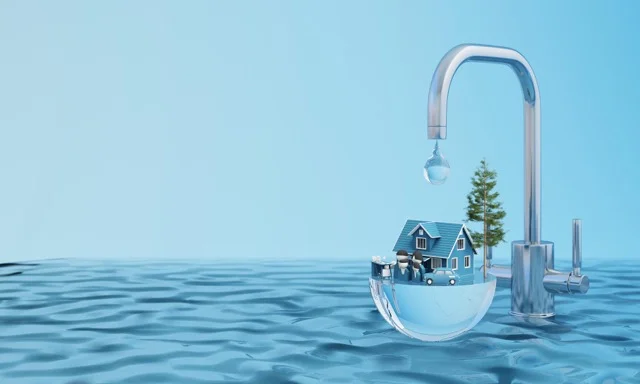Fascination About Reclaim Waste
Fascination About Reclaim Waste
Blog Article
The Main Principles Of Reclaim Waste
Table of ContentsReclaim Waste - TruthsSome Ideas on Reclaim Waste You Should KnowFacts About Reclaim Waste UncoveredNot known Details About Reclaim Waste Reclaim Waste - The Facts
Domestic sewage waste refers to the waste and products from a property septic tank. The correct monitoring and disposal of residential sewage waste call for liquid waste to be moved to a sewer treatment plant where the correct methods and devices are used to cleanse and dispose of waste.
Business waste frequently consists of potential dangers, such as combustible materials or a blend of liquid and solid waste items, and needs an advanced and comprehensive disposal procedure. The disposal of business waste generally entails the filtration of waste prior to transportation to make certain risk-free and proper disposal. Hazardous waste is developed from byproducts and runoff of industrial processes and manufacturing.
This kind of waste can not utilize the very same sewer management transportation or procedures as septic or business fluids. The hazardous waste monitoring process requires the assessment and screening of fluid waste prior to it undertakes the disposal procedure (liquid waste disposal). Drainage waste is the fluid waste that originates from drainage and excess stormwater in very booming locations or cities
Drainage waste can create contamination and flooding if not dealt with appropriately. Find out more concerning drain cleansing and waste administration. Making sure correct waste administration can protect against calamities and lower ecological harm. Both individuals in household settings and specialists in commercial or manufacturing industries can gain from understanding the processes and regulations of fluid waste management.
Facts About Reclaim Waste Revealed
Get in touch with PROS Services today to discover our waste administration and disposal solutions and the correct ways to take care of the liquid waste you produce.
(https://www.ted.com/profiles/48198485/about)This so-called 'wastewater' is not just a crucial source yet, after treatment, will be launched to our land, rivers or the ocean. Utilized water from toilets, showers, baths, kitchen sinks, laundries and industrial procedures is recognized as wastewater.

water used to cool machinery or tidy plant and equipment). Stormwater, a type of wastewater, is drainage that flows from farming and metropolitan areas such as roofing systems, parks, yards, roadways, paths and rain gutters into stormwater drains, after rainfall. Stormwater streams unattended directly to regional creeks or rivers, eventually reaching the sea.
Some Known Details About Reclaim Waste
In Queensland, many wastewater is treated at sewage therapy plants. Wastewater is transported from domestic or industrial websites through a system of drains and pump terminals, known as sewerage reticulation, to a sewage therapy plant. Neighborhood governments develop, keep and operate most sewer treatment plants. Operators are certified under the Environmental Management Act 1994 to discharge cured wastewater at an acceptable ecological requirement into rivers.
The Division of Natural Resources suggests city governments about managing, operating and keeping sewerage systems and therapy plants. In unsewered areas, neighborhood federal governments may require homeowners to install private or house sewage therapy systems to deal with residential wastewater from toilets, kitchens, washrooms and washings. The Division of Natural Resources authorises using house systems when they are shown to be efficient.
A lot of stormwater gets no therapy. In some brand-new subdivisions, therapy of some stormwater to remove clutter, sand and gravel has started using gross pollutant traps. Wastewater treatment takes place in four stages: Gets rid of solid issue. Bigger solids, such as plastics and various other items mistakenly released to sewers, are removed when wastewater is gone through displays.
Wastewater after that moves right into large tanks where solids resolve and are eliminated as sludge. Grease and residue are skimmed from the surface. Uses tiny living organisms called micro-organisms to break down and eliminate continuing to be dissolved wastes and fine bits. Micro-organisms and wastes are included in the sludge. Removes nitrogen and phosphorus nutrients that might create algal blooms in our waterways and intimidate aquatic life.
Reclaim Waste Can Be Fun For Anyone
Nutrient elimination is not readily available at all sewer treatment plants because it requires pricey specialized devices. Clear liquid effluent produced after treatment might still consist of disease-causing micro-organisms - liquid waste disposal melbourne.

The majority of wastewater streams right into the sewerage system. Under the Act, neighborhood governments carry out approvals and permits for ecologically pertinent activities (Periods) including wastewater launches that may have a neighborhood effect.
Some Ideas on Reclaim Waste You Need To Know
Or else, samples are considered lab analysis. Typically numerous examinations are needed to establish the levels of each of the various contaminants such as oils, hefty metals and pesticides in water. Monitoring provides factual info about water quality and can validate that permit conditions are being met. The info gotten through monitoring provides the basis for making water quality choices.
Report this page